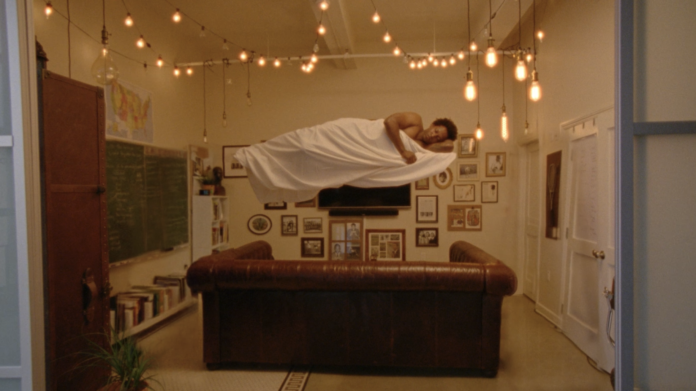The seemingly never-ending saga of COVID reached another variant-wave crest last month, canceling a lot of live events—not least film festivals, including Sundance, which made a rather last-minute switch to “virtual” for the second year in a row. But things are looking up in February, with an apparent peak-passing for Omicron, and San Francisco as usual having emerged fairly unscathed. Thus SF Indiefest is (as of this writing) going full steam ahead for a 24th edition that will take place both in-person at the Roxie Theater and online via On Demand streaming. A little more confined in timespan than some prior years, it runs Thurs/3 through Sun/13.
Indiefest has traditionally been more tilted toward programming that’s more fun than intellectually or artistically heavyweight—you won’t find a ton of social-justice documentaries or experimental abstractions. But opening night this year offers an unusually weighty double-bill, in thematic terms, with two films that will also be opening regular limited runs at the Roxie on February 11. Writer-director-star Skinner Myers’ The Sleeping Negro charts an upwardly mobile young Black professional as the rage and alienation he’s been “suppressing my whole life” erupts. Less a conventional narrative than a series of point-illustrating arguments and setpieces, it’s like an indie Falling Down with a sensibility that modernizes the self-examining monologue of Ralph Ellison’s Invisible Man.
It’s followed by Josef Kubota Wladyka’s Catch the Fair One, the only title in the program that will not be available for streaming. Real-life boxing champ Kali Reis plays Kaylee, a retired pro fighter who goes undercover in an attempt to find the younger sister who was apparently abducted by sex traffickers. Needless to say, this leads her into some rather hairy situations. Atmospheric and well-shot, this thriller may sound like another trot down the pulpy action lane of Taken, et al., but it’s more in the gritty realm of movies like Winter’s Bone and Wind River.
The festival’s “Centerpiece” selection, playing the Roxie Sat/5 is Andrew Gaynord’s All My Friends Hate Me, in which the birthday boy (Tom Stourton) attending a country-estate reunion of college friends in his honor begins to fear he is the object of some cruel practical joke. I didn’t buy a climactic turnabout in plot logic, but up to that point it’s an effectively discomfiting mix of social satire and paranoid thriller. Another British film treads vaguely similar they’re-all-against-me black comedy terrain: In Nick GIllespie’s Paul’s Dood’s Deadly Lunch Break, the titular charity shop worker and pathetic TV-talent-show-contestant-wannabe (Tom Meeten) suffers terrible slights from callous strangers and ostensible friends alike. Setting out to avenge himself, he finds his general ineptitude hard to shake—but fate just might deliver justice to the guilty parties anyway.
The official closing night features on Thurs/10 (the festival continues online through Sun/13) were not available for preview, but look promising. Eddie Martin’s documentary We Were Once Kids interviews participants in Larry Clark’s 1995 Kids, the first of that famed photographer’s rather creepy celluloid gawks at underage sexuality. Surprise! Turns out the experience and its aftermath were not pleasant for all concerned, whose teenaged alumni included Chloe Sevigny and Harmony Korine. Adults acting like kids rather than vice versa are the focus of Harpo and Lenny Guit’s contrastingly silly Mother Schmuckers, a bad-taste comedy said to be an energetic French indie equivalent to Dumb and Dumber.
While as usual it’s US indies that comprise most of Indiefest, that’s not the only foreign feature in a program that features titles from Italy (Double), Czech Republic (Lifeline), the Philippines (Lucid), Switzerland (Wet Dogs) and Japan (Pretenders).
Particularly worthwhile is Iranian director Siamak Etemadi’s European co-production Pari, in which a couple arrive in Athens to visit their son, whom they’d sent to study at university here two years earlier. Not only does he fail to meet them at the airport, it turns out he’s been missing for months—and never even really started his purported studies. Well-meaning fellow Iranians expats they meet assume the boy “lost his way” amongst the “so-called freedoms” of this non-Islamic society. But as the search for him drags fruitlessly on, until the rigid, controlling husband loses interest, this hitherto passive wife and mother begins to become someone else—just as her only child presumably has. It’s an atmospheric tale with a commanding lead performance by Melika Foroutan. This view of Athens’ seamy underside is not one you’ll find in the guidebooks.
Features of local interest include Joselito Serlings’ twenty-years-in-the-making Love Letter Templates, an episodic dive into the excesses of SF’s Oughties club scene whose disparate footage is stylistically unified by rotoscope animation. Fellow city resident Paul Owens’ Landlocked mixes documentary and fantasy elements (as well as his own family members) in a meditation on the perils of nostalgia, while Adriana Marchione’s documentary The Creative High looks at the relationship between art-making and addiction recovery.
Other nonfiction features encompass looks at the Airstream community (Alumination), fellows who are very into their felines (Cat Daddies), and adolescence disrupted by COVID (Quaranteened).
As ever, there’s an even greater range of genre, style et al. in the festival’s 42 shorts, many of which are grouped in specially themed programs. Plus Indiefest offers non-filmic events including DJ’d parties, and the ever-popular Bad Art Gallery, all free of admission charge. (Face masks and vaccination proof required, however, as at the Roxie shows.)
SF Indiefest runs at the Roxie Theater Feb. 3-10, with its online component continuing through Feb. 13. For full program and ticket info, go to www.sfindie.com.






